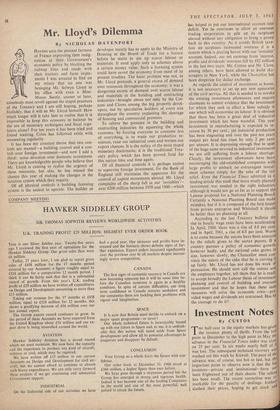Mr. Lloyd's Dilemma
By NICHOLAS
DAVENPORT
It has been my constant theme that two con- trols are wanted—a building control and a con- trol over foreign investment—and now I add a third: some direction over domestic investment. There are knowledgeable people who believe that Mr. Lloyd is coming to realise the urgency of these measures, but alas, he has missed the chance this year of making the changes in the taxation system which they require.
Of all physical controls a building licensing system is the easiest to operate. The builder or developer merely has to apply to the Ministry of Housing or the Board of Trade for a licence before he starts to use up scarce labour or materials. It need apply only to schemes above a certain money value. Such a licensing system could have saved the economy from most of its present troubles. The basic problem was not, as Mr. Lloyd pretends, a general excess of demand over resources throughout the economy; it was a dangerous excess of demand over scarce labour and materials in the building and contracting industries—brought about not only by the Cot- tons and Clores among the big property devel- opers, but by speculative builders of every size throughout the country exploiting the shortage of housing and commercial premises.
To relieve the pressure in the building and contracting industries by squeezing the whole economy, by forcing everyone to consume less of everything, is to waste our productive re- sources, raise our industrial costs and worsen our export chances. It is the policy of the most stupid monetary doctrinaire; it is the traditional Trea- sury policy which has been proved fatal for this nation time and time again.
Of all financial controls it is perhaps easiest to supervise foreign investment, for the Bank of England still maintains the apparatus for the control of capital movements abroad. Mr. Lloyd complains of the sharp fall in our 'invisibles'— over £200 million between 1958 and 1960—which
has helped to put our international account into deficit. Yet he continues to allow an overseas trading corporation to pile up its surpluses " abroad without any obligation to bring a penny back to this country. As it avoids British taxa- tion on surpluses reinvested overseas it is a system which is playing havoc with our 'invisible' account. Indeed, our net earnings from 'interest, profits and dividends' overseas fell by £82 million in the last two years. Mr. Cotton and Mr Clore, among others, have been allowed to build sky- scrapers in New York, while the Chancellor has been desperate for dollar exchange.
As regards the control of investment at home, it is not necessary to set up any new apparatus of the civil service. All that is needed is to revoke the existing investment allowances and require claimants to submit evidence that the investment for which they seek in effect a State subsidy is one which will economise on labour. It is obvious that there has been a great deal of industrial investment which has been wasteful. This year investment in manufacturing is expected to in- crease by 30 per cent.; yet industrial production, has been stagnating and over the past ten years output per head has risen by only 2 per cent. per annum. It is depressing enough that in spite of the huge sums devoted to industrial investment we are still suffering from a labour shortage. Clearly, the investment allowances have been' encouraging the old-established companies with large profits to embark on extravagant invest- ment schemes simply for the sake of the tax relief. Even the Financial Times admitted in a leading article this week that more wisely planned investment was needed in the right industries, although it would not go so far as to support the Labour proposal for a National Planning Board. Certainly a National Planning Board can make mistakes, but if it is composed of the best brains from private enterprise and Whitehall it should be better than no planning at all.
According to the last Treasury bulletin the rise in hourly wage rates have been accelerating. In April, 1960, there was a rise of 4.8 per cent. and in April, 1961, a rise of 6.8 per cent. Worse is to come because the unions have been annoyed by the reliefs given to the surtax payers. If country pursues a policy of economic growth, however badly, and the national cake grows ifl size, however slowly, the Chancellor must con. vince the eaters of the cake that he is carving it up fairly. Mr. Lloyd has not done his work of persuasion. He should now call the unions and. the employers together, tell them that he is readr to accept broadly the Labour thesis of investme planning and control of building and overseas investment and that he hopes that these sane measures will solve the economic crisis—pro' vided wages and dividends are restrained. Has he the courage to do it? at


























































 Previous page
Previous page